Leadership Analysis: Steve Jobs' Impact on Apple's Success
VerifiedAdded on 2020/07/22
|13
|3566
|42
Report
AI Summary
This report provides a critical analysis of Steve Jobs' leadership style, examining his role as both a manager and a leader. It delves into the characteristics that drove Apple's success, including his vision, strong leadership, and innovative thinking. The report evaluates various leadership theories, such as trait theory and behavioral theory, to understand Jobs' approach. It also explores the consequences of his leadership style, including his focus and ability to adapt. Furthermore, the report discusses whether Apple now needs a manager more than a leader. The analysis highlights Jobs' managerial skills, like his ability to integrate organizational and personal goals, and his leadership qualities, such as integrity and decision-making skills. The report concludes by summarizing the key aspects of Jobs' impact on Apple and the broader business landscape.

LEADING CHANGES
Paraphrase This Document
Need a fresh take? Get an instant paraphrase of this document with our AI Paraphraser
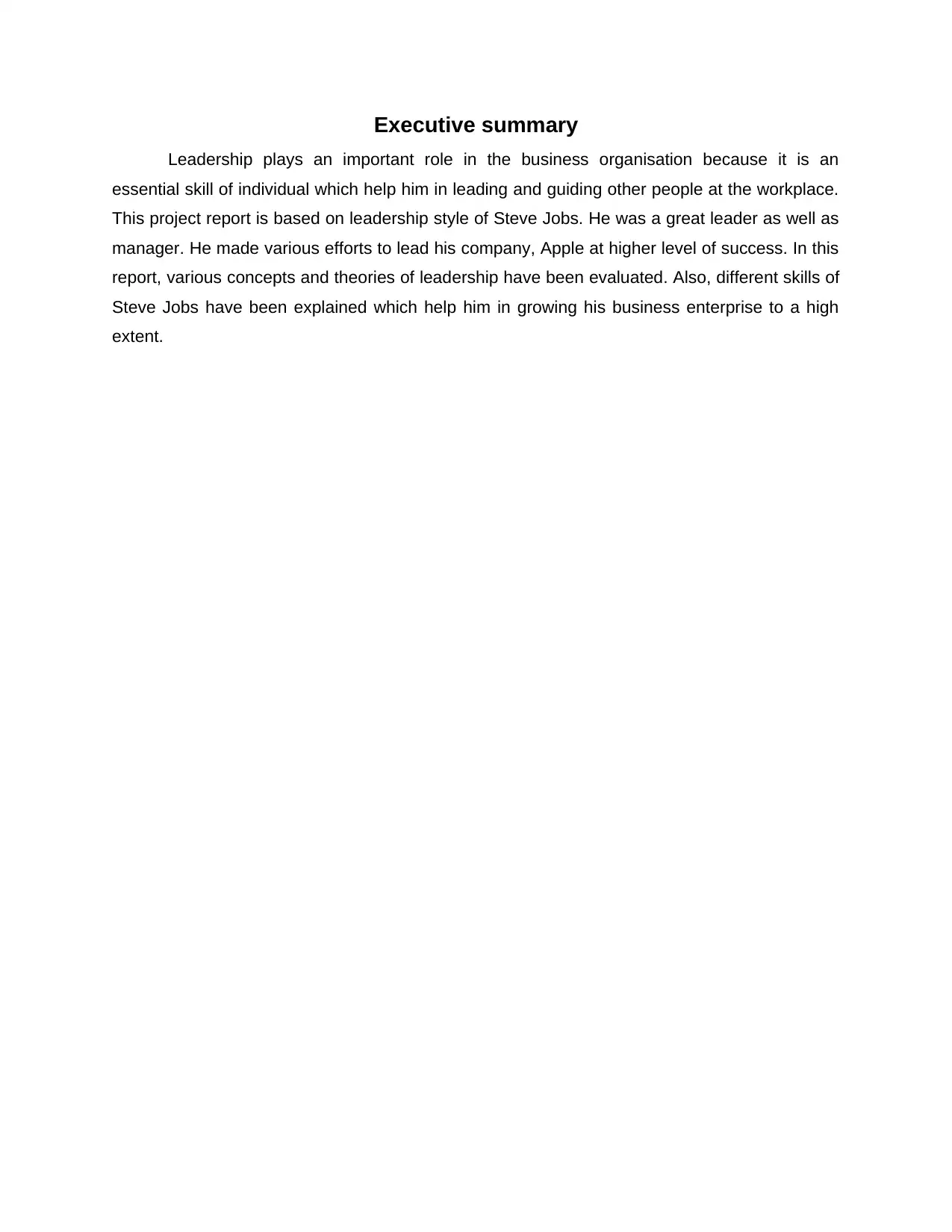
Executive summary
Leadership plays an important role in the business organisation because it is an
essential skill of individual which help him in leading and guiding other people at the workplace.
This project report is based on leadership style of Steve Jobs. He was a great leader as well as
manager. He made various efforts to lead his company, Apple at higher level of success. In this
report, various concepts and theories of leadership have been evaluated. Also, different skills of
Steve Jobs have been explained which help him in growing his business enterprise to a high
extent.
Leadership plays an important role in the business organisation because it is an
essential skill of individual which help him in leading and guiding other people at the workplace.
This project report is based on leadership style of Steve Jobs. He was a great leader as well as
manager. He made various efforts to lead his company, Apple at higher level of success. In this
report, various concepts and theories of leadership have been evaluated. Also, different skills of
Steve Jobs have been explained which help him in growing his business enterprise to a high
extent.
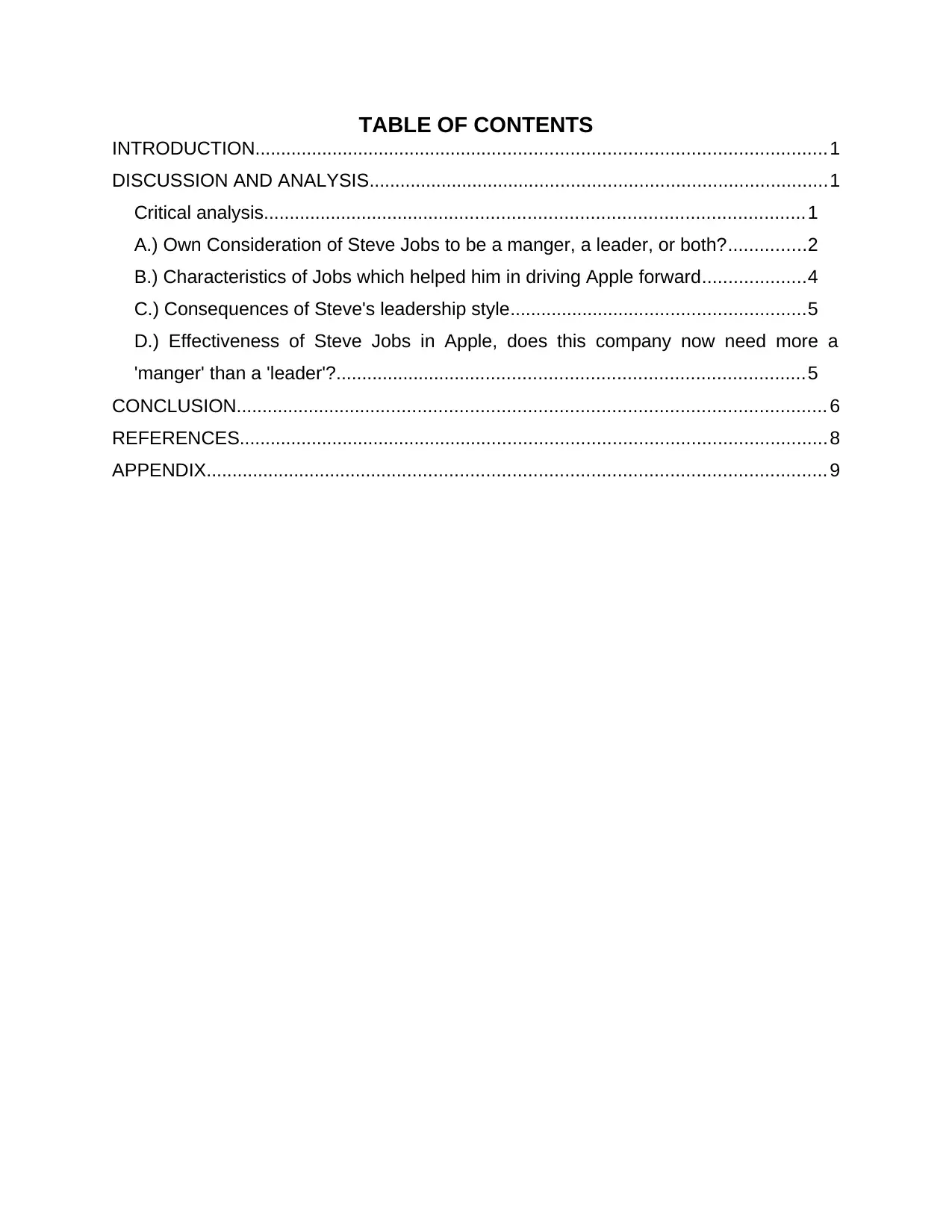
TABLE OF CONTENTS
INTRODUCTION..............................................................................................................1
DISCUSSION AND ANALYSIS........................................................................................1
Critical analysis........................................................................................................1
A.) Own Consideration of Steve Jobs to be a manger, a leader, or both?...............2
B.) Characteristics of Jobs which helped him in driving Apple forward....................4
C.) Consequences of Steve's leadership style.........................................................5
D.) Effectiveness of Steve Jobs in Apple, does this company now need more a
'manger' than a 'leader'?..........................................................................................5
CONCLUSION................................................................................................................. 6
REFERENCES.................................................................................................................8
APPENDIX....................................................................................................................... 9
INTRODUCTION..............................................................................................................1
DISCUSSION AND ANALYSIS........................................................................................1
Critical analysis........................................................................................................1
A.) Own Consideration of Steve Jobs to be a manger, a leader, or both?...............2
B.) Characteristics of Jobs which helped him in driving Apple forward....................4
C.) Consequences of Steve's leadership style.........................................................5
D.) Effectiveness of Steve Jobs in Apple, does this company now need more a
'manger' than a 'leader'?..........................................................................................5
CONCLUSION................................................................................................................. 6
REFERENCES.................................................................................................................8
APPENDIX....................................................................................................................... 9
⊘ This is a preview!⊘
Do you want full access?
Subscribe today to unlock all pages.

Trusted by 1+ million students worldwide
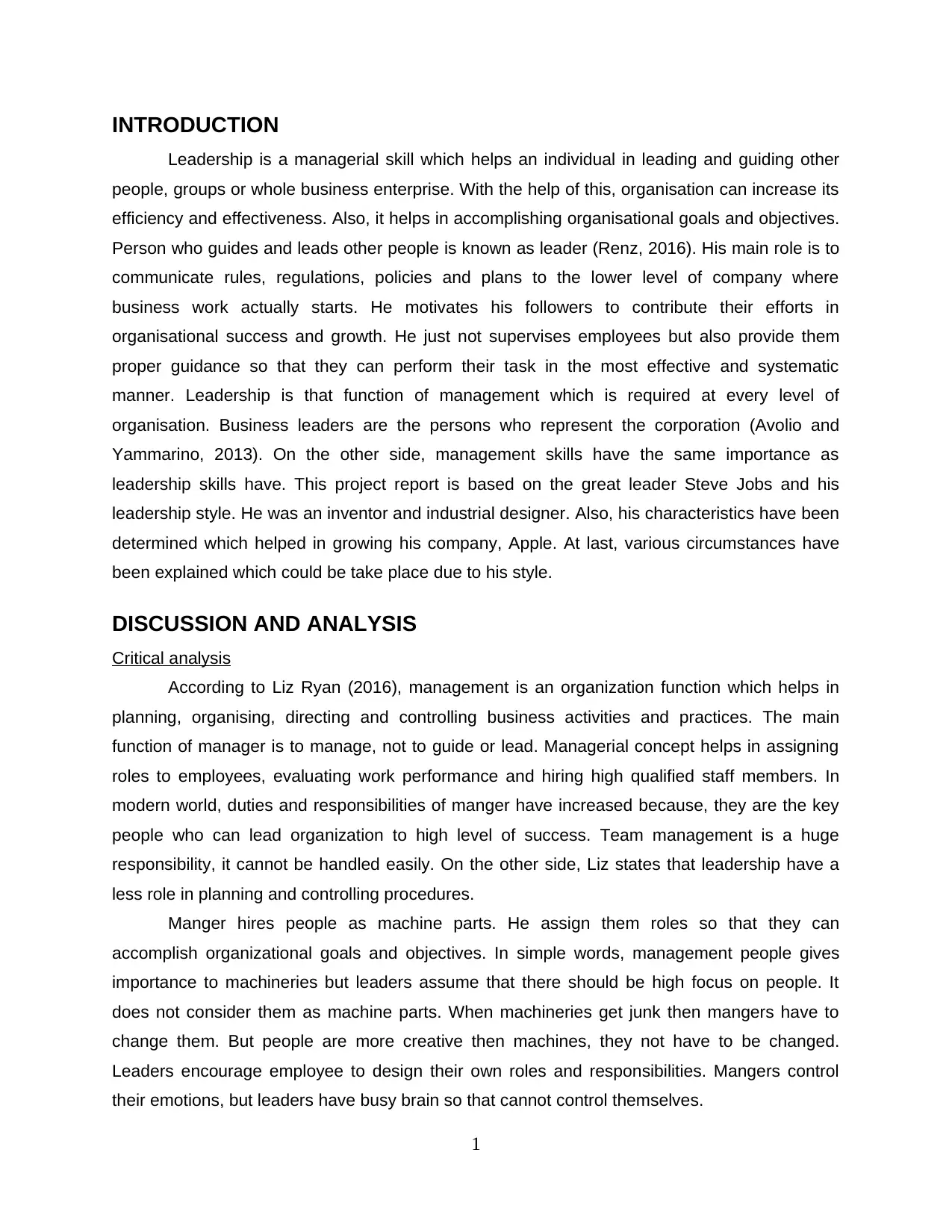
INTRODUCTION
Leadership is a managerial skill which helps an individual in leading and guiding other
people, groups or whole business enterprise. With the help of this, organisation can increase its
efficiency and effectiveness. Also, it helps in accomplishing organisational goals and objectives.
Person who guides and leads other people is known as leader (Renz, 2016). His main role is to
communicate rules, regulations, policies and plans to the lower level of company where
business work actually starts. He motivates his followers to contribute their efforts in
organisational success and growth. He just not supervises employees but also provide them
proper guidance so that they can perform their task in the most effective and systematic
manner. Leadership is that function of management which is required at every level of
organisation. Business leaders are the persons who represent the corporation (Avolio and
Yammarino, 2013). On the other side, management skills have the same importance as
leadership skills have. This project report is based on the great leader Steve Jobs and his
leadership style. He was an inventor and industrial designer. Also, his characteristics have been
determined which helped in growing his company, Apple. At last, various circumstances have
been explained which could be take place due to his style.
DISCUSSION AND ANALYSIS
Critical analysis
According to Liz Ryan (2016), management is an organization function which helps in
planning, organising, directing and controlling business activities and practices. The main
function of manager is to manage, not to guide or lead. Managerial concept helps in assigning
roles to employees, evaluating work performance and hiring high qualified staff members. In
modern world, duties and responsibilities of manger have increased because, they are the key
people who can lead organization to high level of success. Team management is a huge
responsibility, it cannot be handled easily. On the other side, Liz states that leadership have a
less role in planning and controlling procedures.
Manger hires people as machine parts. He assign them roles so that they can
accomplish organizational goals and objectives. In simple words, management people gives
importance to machineries but leaders assume that there should be high focus on people. It
does not consider them as machine parts. When machineries get junk then mangers have to
change them. But people are more creative then machines, they not have to be changed.
Leaders encourage employee to design their own roles and responsibilities. Mangers control
their emotions, but leaders have busy brain so that cannot control themselves.
1
Leadership is a managerial skill which helps an individual in leading and guiding other
people, groups or whole business enterprise. With the help of this, organisation can increase its
efficiency and effectiveness. Also, it helps in accomplishing organisational goals and objectives.
Person who guides and leads other people is known as leader (Renz, 2016). His main role is to
communicate rules, regulations, policies and plans to the lower level of company where
business work actually starts. He motivates his followers to contribute their efforts in
organisational success and growth. He just not supervises employees but also provide them
proper guidance so that they can perform their task in the most effective and systematic
manner. Leadership is that function of management which is required at every level of
organisation. Business leaders are the persons who represent the corporation (Avolio and
Yammarino, 2013). On the other side, management skills have the same importance as
leadership skills have. This project report is based on the great leader Steve Jobs and his
leadership style. He was an inventor and industrial designer. Also, his characteristics have been
determined which helped in growing his company, Apple. At last, various circumstances have
been explained which could be take place due to his style.
DISCUSSION AND ANALYSIS
Critical analysis
According to Liz Ryan (2016), management is an organization function which helps in
planning, organising, directing and controlling business activities and practices. The main
function of manager is to manage, not to guide or lead. Managerial concept helps in assigning
roles to employees, evaluating work performance and hiring high qualified staff members. In
modern world, duties and responsibilities of manger have increased because, they are the key
people who can lead organization to high level of success. Team management is a huge
responsibility, it cannot be handled easily. On the other side, Liz states that leadership have a
less role in planning and controlling procedures.
Manger hires people as machine parts. He assign them roles so that they can
accomplish organizational goals and objectives. In simple words, management people gives
importance to machineries but leaders assume that there should be high focus on people. It
does not consider them as machine parts. When machineries get junk then mangers have to
change them. But people are more creative then machines, they not have to be changed.
Leaders encourage employee to design their own roles and responsibilities. Mangers control
their emotions, but leaders have busy brain so that cannot control themselves.
1
Paraphrase This Document
Need a fresh take? Get an instant paraphrase of this document with our AI Paraphraser
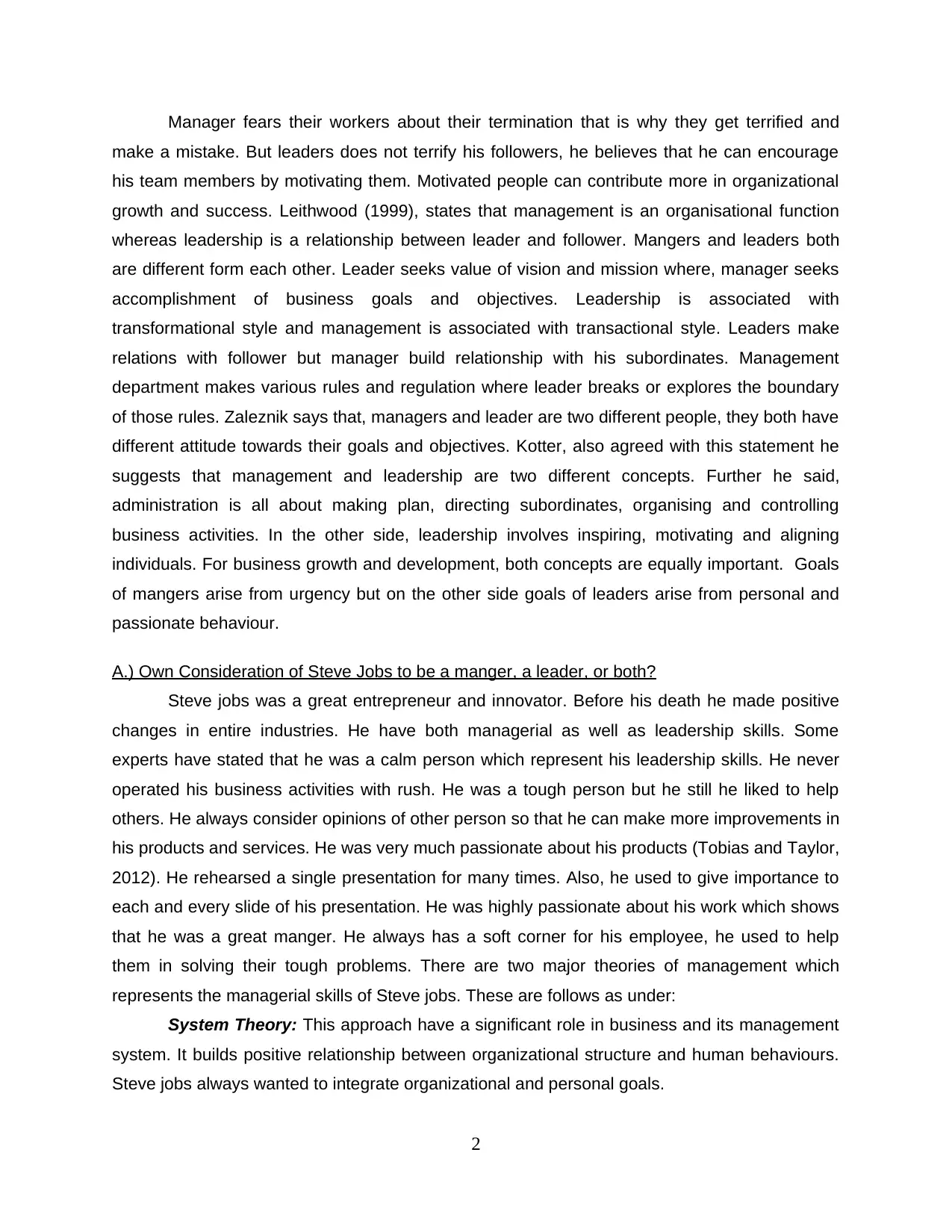
Manager fears their workers about their termination that is why they get terrified and
make a mistake. But leaders does not terrify his followers, he believes that he can encourage
his team members by motivating them. Motivated people can contribute more in organizational
growth and success. Leithwood (1999), states that management is an organisational function
whereas leadership is a relationship between leader and follower. Mangers and leaders both
are different form each other. Leader seeks value of vision and mission where, manager seeks
accomplishment of business goals and objectives. Leadership is associated with
transformational style and management is associated with transactional style. Leaders make
relations with follower but manager build relationship with his subordinates. Management
department makes various rules and regulation where leader breaks or explores the boundary
of those rules. Zaleznik says that, managers and leader are two different people, they both have
different attitude towards their goals and objectives. Kotter, also agreed with this statement he
suggests that management and leadership are two different concepts. Further he said,
administration is all about making plan, directing subordinates, organising and controlling
business activities. In the other side, leadership involves inspiring, motivating and aligning
individuals. For business growth and development, both concepts are equally important. Goals
of mangers arise from urgency but on the other side goals of leaders arise from personal and
passionate behaviour.
A.) Own Consideration of Steve Jobs to be a manger, a leader, or both?
Steve jobs was a great entrepreneur and innovator. Before his death he made positive
changes in entire industries. He have both managerial as well as leadership skills. Some
experts have stated that he was a calm person which represent his leadership skills. He never
operated his business activities with rush. He was a tough person but he still he liked to help
others. He always consider opinions of other person so that he can make more improvements in
his products and services. He was very much passionate about his products (Tobias and Taylor,
2012). He rehearsed a single presentation for many times. Also, he used to give importance to
each and every slide of his presentation. He was highly passionate about his work which shows
that he was a great manger. He always has a soft corner for his employee, he used to help
them in solving their tough problems. There are two major theories of management which
represents the managerial skills of Steve jobs. These are follows as under:
System Theory: This approach have a significant role in business and its management
system. It builds positive relationship between organizational structure and human behaviours.
Steve jobs always wanted to integrate organizational and personal goals.
2
make a mistake. But leaders does not terrify his followers, he believes that he can encourage
his team members by motivating them. Motivated people can contribute more in organizational
growth and success. Leithwood (1999), states that management is an organisational function
whereas leadership is a relationship between leader and follower. Mangers and leaders both
are different form each other. Leader seeks value of vision and mission where, manager seeks
accomplishment of business goals and objectives. Leadership is associated with
transformational style and management is associated with transactional style. Leaders make
relations with follower but manager build relationship with his subordinates. Management
department makes various rules and regulation where leader breaks or explores the boundary
of those rules. Zaleznik says that, managers and leader are two different people, they both have
different attitude towards their goals and objectives. Kotter, also agreed with this statement he
suggests that management and leadership are two different concepts. Further he said,
administration is all about making plan, directing subordinates, organising and controlling
business activities. In the other side, leadership involves inspiring, motivating and aligning
individuals. For business growth and development, both concepts are equally important. Goals
of mangers arise from urgency but on the other side goals of leaders arise from personal and
passionate behaviour.
A.) Own Consideration of Steve Jobs to be a manger, a leader, or both?
Steve jobs was a great entrepreneur and innovator. Before his death he made positive
changes in entire industries. He have both managerial as well as leadership skills. Some
experts have stated that he was a calm person which represent his leadership skills. He never
operated his business activities with rush. He was a tough person but he still he liked to help
others. He always consider opinions of other person so that he can make more improvements in
his products and services. He was very much passionate about his products (Tobias and Taylor,
2012). He rehearsed a single presentation for many times. Also, he used to give importance to
each and every slide of his presentation. He was highly passionate about his work which shows
that he was a great manger. He always has a soft corner for his employee, he used to help
them in solving their tough problems. There are two major theories of management which
represents the managerial skills of Steve jobs. These are follows as under:
System Theory: This approach have a significant role in business and its management
system. It builds positive relationship between organizational structure and human behaviours.
Steve jobs always wanted to integrate organizational and personal goals.
2
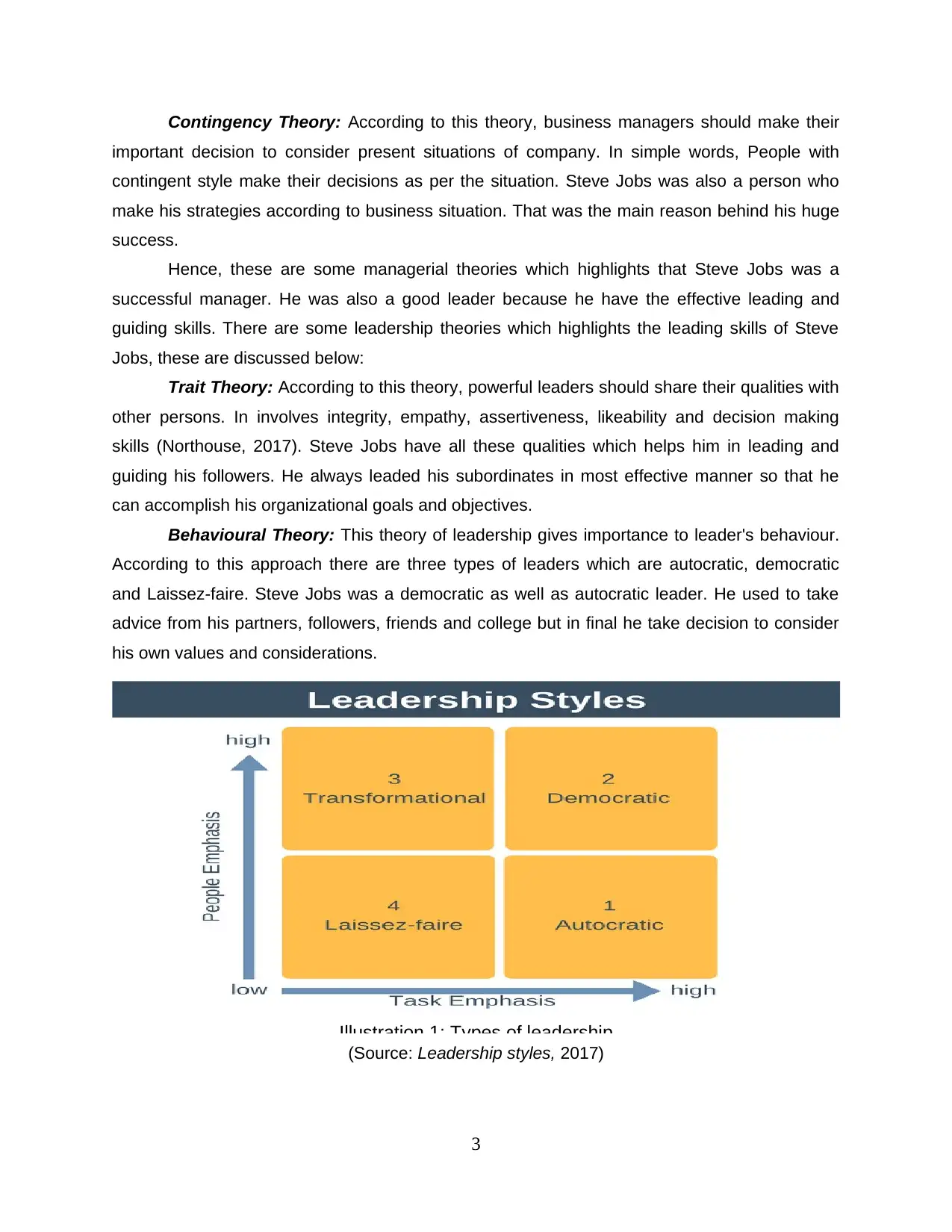
Contingency Theory: According to this theory, business managers should make their
important decision to consider present situations of company. In simple words, People with
contingent style make their decisions as per the situation. Steve Jobs was also a person who
make his strategies according to business situation. That was the main reason behind his huge
success.
Hence, these are some managerial theories which highlights that Steve Jobs was a
successful manager. He was also a good leader because he have the effective leading and
guiding skills. There are some leadership theories which highlights the leading skills of Steve
Jobs, these are discussed below:
Trait Theory: According to this theory, powerful leaders should share their qualities with
other persons. In involves integrity, empathy, assertiveness, likeability and decision making
skills (Northouse, 2017). Steve Jobs have all these qualities which helps him in leading and
guiding his followers. He always leaded his subordinates in most effective manner so that he
can accomplish his organizational goals and objectives.
Behavioural Theory: This theory of leadership gives importance to leader's behaviour.
According to this approach there are three types of leaders which are autocratic, democratic
and Laissez-faire. Steve Jobs was a democratic as well as autocratic leader. He used to take
advice from his partners, followers, friends and college but in final he take decision to consider
his own values and considerations.
(Source: Leadership styles, 2017)
3
Illustration 1: Types of leadership
important decision to consider present situations of company. In simple words, People with
contingent style make their decisions as per the situation. Steve Jobs was also a person who
make his strategies according to business situation. That was the main reason behind his huge
success.
Hence, these are some managerial theories which highlights that Steve Jobs was a
successful manager. He was also a good leader because he have the effective leading and
guiding skills. There are some leadership theories which highlights the leading skills of Steve
Jobs, these are discussed below:
Trait Theory: According to this theory, powerful leaders should share their qualities with
other persons. In involves integrity, empathy, assertiveness, likeability and decision making
skills (Northouse, 2017). Steve Jobs have all these qualities which helps him in leading and
guiding his followers. He always leaded his subordinates in most effective manner so that he
can accomplish his organizational goals and objectives.
Behavioural Theory: This theory of leadership gives importance to leader's behaviour.
According to this approach there are three types of leaders which are autocratic, democratic
and Laissez-faire. Steve Jobs was a democratic as well as autocratic leader. He used to take
advice from his partners, followers, friends and college but in final he take decision to consider
his own values and considerations.
(Source: Leadership styles, 2017)
3
Illustration 1: Types of leadership
⊘ This is a preview!⊘
Do you want full access?
Subscribe today to unlock all pages.

Trusted by 1+ million students worldwide
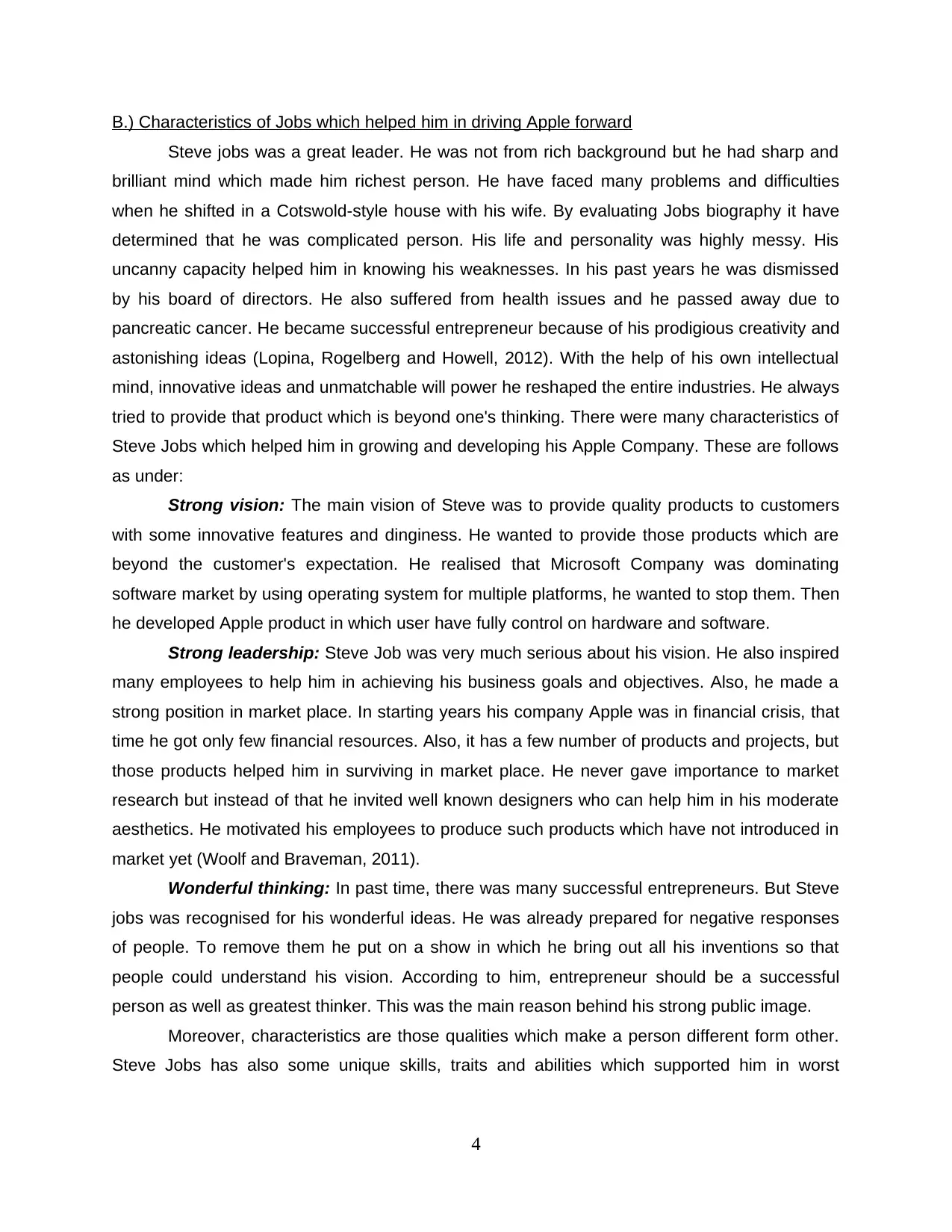
B.) Characteristics of Jobs which helped him in driving Apple forward
Steve jobs was a great leader. He was not from rich background but he had sharp and
brilliant mind which made him richest person. He have faced many problems and difficulties
when he shifted in a Cotswold-style house with his wife. By evaluating Jobs biography it have
determined that he was complicated person. His life and personality was highly messy. His
uncanny capacity helped him in knowing his weaknesses. In his past years he was dismissed
by his board of directors. He also suffered from health issues and he passed away due to
pancreatic cancer. He became successful entrepreneur because of his prodigious creativity and
astonishing ideas (Lopina, Rogelberg and Howell, 2012). With the help of his own intellectual
mind, innovative ideas and unmatchable will power he reshaped the entire industries. He always
tried to provide that product which is beyond one's thinking. There were many characteristics of
Steve Jobs which helped him in growing and developing his Apple Company. These are follows
as under:
Strong vision: The main vision of Steve was to provide quality products to customers
with some innovative features and dinginess. He wanted to provide those products which are
beyond the customer's expectation. He realised that Microsoft Company was dominating
software market by using operating system for multiple platforms, he wanted to stop them. Then
he developed Apple product in which user have fully control on hardware and software.
Strong leadership: Steve Job was very much serious about his vision. He also inspired
many employees to help him in achieving his business goals and objectives. Also, he made a
strong position in market place. In starting years his company Apple was in financial crisis, that
time he got only few financial resources. Also, it has a few number of products and projects, but
those products helped him in surviving in market place. He never gave importance to market
research but instead of that he invited well known designers who can help him in his moderate
aesthetics. He motivated his employees to produce such products which have not introduced in
market yet (Woolf and Braveman, 2011).
Wonderful thinking: In past time, there was many successful entrepreneurs. But Steve
jobs was recognised for his wonderful ideas. He was already prepared for negative responses
of people. To remove them he put on a show in which he bring out all his inventions so that
people could understand his vision. According to him, entrepreneur should be a successful
person as well as greatest thinker. This was the main reason behind his strong public image.
Moreover, characteristics are those qualities which make a person different form other.
Steve Jobs has also some unique skills, traits and abilities which supported him in worst
4
Steve jobs was a great leader. He was not from rich background but he had sharp and
brilliant mind which made him richest person. He have faced many problems and difficulties
when he shifted in a Cotswold-style house with his wife. By evaluating Jobs biography it have
determined that he was complicated person. His life and personality was highly messy. His
uncanny capacity helped him in knowing his weaknesses. In his past years he was dismissed
by his board of directors. He also suffered from health issues and he passed away due to
pancreatic cancer. He became successful entrepreneur because of his prodigious creativity and
astonishing ideas (Lopina, Rogelberg and Howell, 2012). With the help of his own intellectual
mind, innovative ideas and unmatchable will power he reshaped the entire industries. He always
tried to provide that product which is beyond one's thinking. There were many characteristics of
Steve Jobs which helped him in growing and developing his Apple Company. These are follows
as under:
Strong vision: The main vision of Steve was to provide quality products to customers
with some innovative features and dinginess. He wanted to provide those products which are
beyond the customer's expectation. He realised that Microsoft Company was dominating
software market by using operating system for multiple platforms, he wanted to stop them. Then
he developed Apple product in which user have fully control on hardware and software.
Strong leadership: Steve Job was very much serious about his vision. He also inspired
many employees to help him in achieving his business goals and objectives. Also, he made a
strong position in market place. In starting years his company Apple was in financial crisis, that
time he got only few financial resources. Also, it has a few number of products and projects, but
those products helped him in surviving in market place. He never gave importance to market
research but instead of that he invited well known designers who can help him in his moderate
aesthetics. He motivated his employees to produce such products which have not introduced in
market yet (Woolf and Braveman, 2011).
Wonderful thinking: In past time, there was many successful entrepreneurs. But Steve
jobs was recognised for his wonderful ideas. He was already prepared for negative responses
of people. To remove them he put on a show in which he bring out all his inventions so that
people could understand his vision. According to him, entrepreneur should be a successful
person as well as greatest thinker. This was the main reason behind his strong public image.
Moreover, characteristics are those qualities which make a person different form other.
Steve Jobs has also some unique skills, traits and abilities which supported him in worst
4
Paraphrase This Document
Need a fresh take? Get an instant paraphrase of this document with our AI Paraphraser
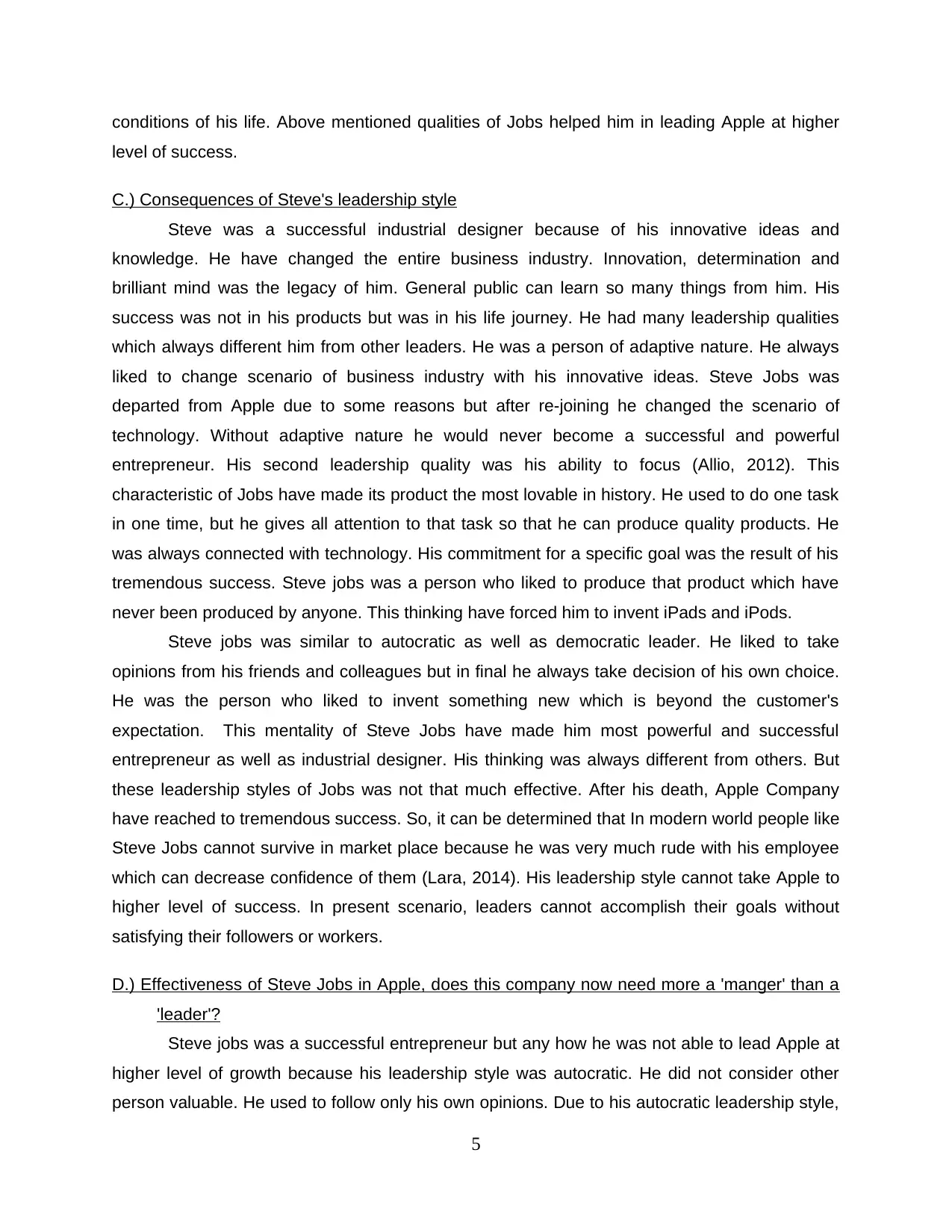
conditions of his life. Above mentioned qualities of Jobs helped him in leading Apple at higher
level of success.
C.) Consequences of Steve's leadership style
Steve was a successful industrial designer because of his innovative ideas and
knowledge. He have changed the entire business industry. Innovation, determination and
brilliant mind was the legacy of him. General public can learn so many things from him. His
success was not in his products but was in his life journey. He had many leadership qualities
which always different him from other leaders. He was a person of adaptive nature. He always
liked to change scenario of business industry with his innovative ideas. Steve Jobs was
departed from Apple due to some reasons but after re-joining he changed the scenario of
technology. Without adaptive nature he would never become a successful and powerful
entrepreneur. His second leadership quality was his ability to focus (Allio, 2012). This
characteristic of Jobs have made its product the most lovable in history. He used to do one task
in one time, but he gives all attention to that task so that he can produce quality products. He
was always connected with technology. His commitment for a specific goal was the result of his
tremendous success. Steve jobs was a person who liked to produce that product which have
never been produced by anyone. This thinking have forced him to invent iPads and iPods.
Steve jobs was similar to autocratic as well as democratic leader. He liked to take
opinions from his friends and colleagues but in final he always take decision of his own choice.
He was the person who liked to invent something new which is beyond the customer's
expectation. This mentality of Steve Jobs have made him most powerful and successful
entrepreneur as well as industrial designer. His thinking was always different from others. But
these leadership styles of Jobs was not that much effective. After his death, Apple Company
have reached to tremendous success. So, it can be determined that In modern world people like
Steve Jobs cannot survive in market place because he was very much rude with his employee
which can decrease confidence of them (Lara, 2014). His leadership style cannot take Apple to
higher level of success. In present scenario, leaders cannot accomplish their goals without
satisfying their followers or workers.
D.) Effectiveness of Steve Jobs in Apple, does this company now need more a 'manger' than a
'leader'?
Steve jobs was a successful entrepreneur but any how he was not able to lead Apple at
higher level of growth because his leadership style was autocratic. He did not consider other
person valuable. He used to follow only his own opinions. Due to his autocratic leadership style,
5
level of success.
C.) Consequences of Steve's leadership style
Steve was a successful industrial designer because of his innovative ideas and
knowledge. He have changed the entire business industry. Innovation, determination and
brilliant mind was the legacy of him. General public can learn so many things from him. His
success was not in his products but was in his life journey. He had many leadership qualities
which always different him from other leaders. He was a person of adaptive nature. He always
liked to change scenario of business industry with his innovative ideas. Steve Jobs was
departed from Apple due to some reasons but after re-joining he changed the scenario of
technology. Without adaptive nature he would never become a successful and powerful
entrepreneur. His second leadership quality was his ability to focus (Allio, 2012). This
characteristic of Jobs have made its product the most lovable in history. He used to do one task
in one time, but he gives all attention to that task so that he can produce quality products. He
was always connected with technology. His commitment for a specific goal was the result of his
tremendous success. Steve jobs was a person who liked to produce that product which have
never been produced by anyone. This thinking have forced him to invent iPads and iPods.
Steve jobs was similar to autocratic as well as democratic leader. He liked to take
opinions from his friends and colleagues but in final he always take decision of his own choice.
He was the person who liked to invent something new which is beyond the customer's
expectation. This mentality of Steve Jobs have made him most powerful and successful
entrepreneur as well as industrial designer. His thinking was always different from others. But
these leadership styles of Jobs was not that much effective. After his death, Apple Company
have reached to tremendous success. So, it can be determined that In modern world people like
Steve Jobs cannot survive in market place because he was very much rude with his employee
which can decrease confidence of them (Lara, 2014). His leadership style cannot take Apple to
higher level of success. In present scenario, leaders cannot accomplish their goals without
satisfying their followers or workers.
D.) Effectiveness of Steve Jobs in Apple, does this company now need more a 'manger' than a
'leader'?
Steve jobs was a successful entrepreneur but any how he was not able to lead Apple at
higher level of growth because his leadership style was autocratic. He did not consider other
person valuable. He used to follow only his own opinions. Due to his autocratic leadership style,
5

he liked to be surrounded with minded people. He had demanding nature and he did not
consider other's point of views. For better growth and development, organisation needs that
leader who can motivate his followers and also can resolve their problems (Krapfl and Kruja,
2015). Motivated and satisfied employees can contribute more in accomplishing organizational
goals and objectives. Every entrepreneur should use democratic leadership style because
through this they can build high morale and coordination within work place, which is highly
important for organizational growth and development.
Steve jobs was a highly talented person and had various skills and abilities. But he also
had some negative skills and abilities. He was a successful entrepreneur but not powerful
leaders. His autocratic behaviour have made him ineffective manager. He did not consider other
people valuable because his thinking was that no one is better than him. In present scenario,
this kind of leader cannot lead company to next level of growth. After death of Steve Jobs, Apple
required a high-determined leader who can increase its efficiency and effectiveness.
In present time, Apple requires a leader who will consider the opinions of employees and
provide them better satisfaction. Because dissatisfaction of workers can result in organisation
loss. Tim cook is the current leader of Apple Inc. He follows democratic leadership style
(Dubberly, 2012). While making important decision regarding company he takes advise of his
partners, employees and friends. This nature makes him most successful leaders because
without the support of workers and colleague no leaders can perform his duties and
responsibilities. Tim cook have all those qualities, characteristics and skills which are required
for tremendous success of business organization. For better growth, Apple needs a good
working environment. Current leaders of this company have decentralised his authorities within
work place so that employees can feel confident and contribute more in achieving desired
results.
CONCLUSION
By evaluating this project report, it has been concluded that leadership is that
managerial concept which helps organisation and its managers in leading their business. The
main function of leader is to define, communicate and measure organizational objectives. He
also known as morale booster because he builds motivating within employees. Also, he
provides good working environment within work place. Without effective manger and leader no
organisation can implement and accomplish its business goals and objectives. It is very much
important for leaders to consider all complaints and problems of his employees so that they can
perform their role without any difficulty. This project report is based on Steve Jobs and his
6
consider other's point of views. For better growth and development, organisation needs that
leader who can motivate his followers and also can resolve their problems (Krapfl and Kruja,
2015). Motivated and satisfied employees can contribute more in accomplishing organizational
goals and objectives. Every entrepreneur should use democratic leadership style because
through this they can build high morale and coordination within work place, which is highly
important for organizational growth and development.
Steve jobs was a highly talented person and had various skills and abilities. But he also
had some negative skills and abilities. He was a successful entrepreneur but not powerful
leaders. His autocratic behaviour have made him ineffective manager. He did not consider other
people valuable because his thinking was that no one is better than him. In present scenario,
this kind of leader cannot lead company to next level of growth. After death of Steve Jobs, Apple
required a high-determined leader who can increase its efficiency and effectiveness.
In present time, Apple requires a leader who will consider the opinions of employees and
provide them better satisfaction. Because dissatisfaction of workers can result in organisation
loss. Tim cook is the current leader of Apple Inc. He follows democratic leadership style
(Dubberly, 2012). While making important decision regarding company he takes advise of his
partners, employees and friends. This nature makes him most successful leaders because
without the support of workers and colleague no leaders can perform his duties and
responsibilities. Tim cook have all those qualities, characteristics and skills which are required
for tremendous success of business organization. For better growth, Apple needs a good
working environment. Current leaders of this company have decentralised his authorities within
work place so that employees can feel confident and contribute more in achieving desired
results.
CONCLUSION
By evaluating this project report, it has been concluded that leadership is that
managerial concept which helps organisation and its managers in leading their business. The
main function of leader is to define, communicate and measure organizational objectives. He
also known as morale booster because he builds motivating within employees. Also, he
provides good working environment within work place. Without effective manger and leader no
organisation can implement and accomplish its business goals and objectives. It is very much
important for leaders to consider all complaints and problems of his employees so that they can
perform their role without any difficulty. This project report is based on Steve Jobs and his
6
⊘ This is a preview!⊘
Do you want full access?
Subscribe today to unlock all pages.

Trusted by 1+ million students worldwide
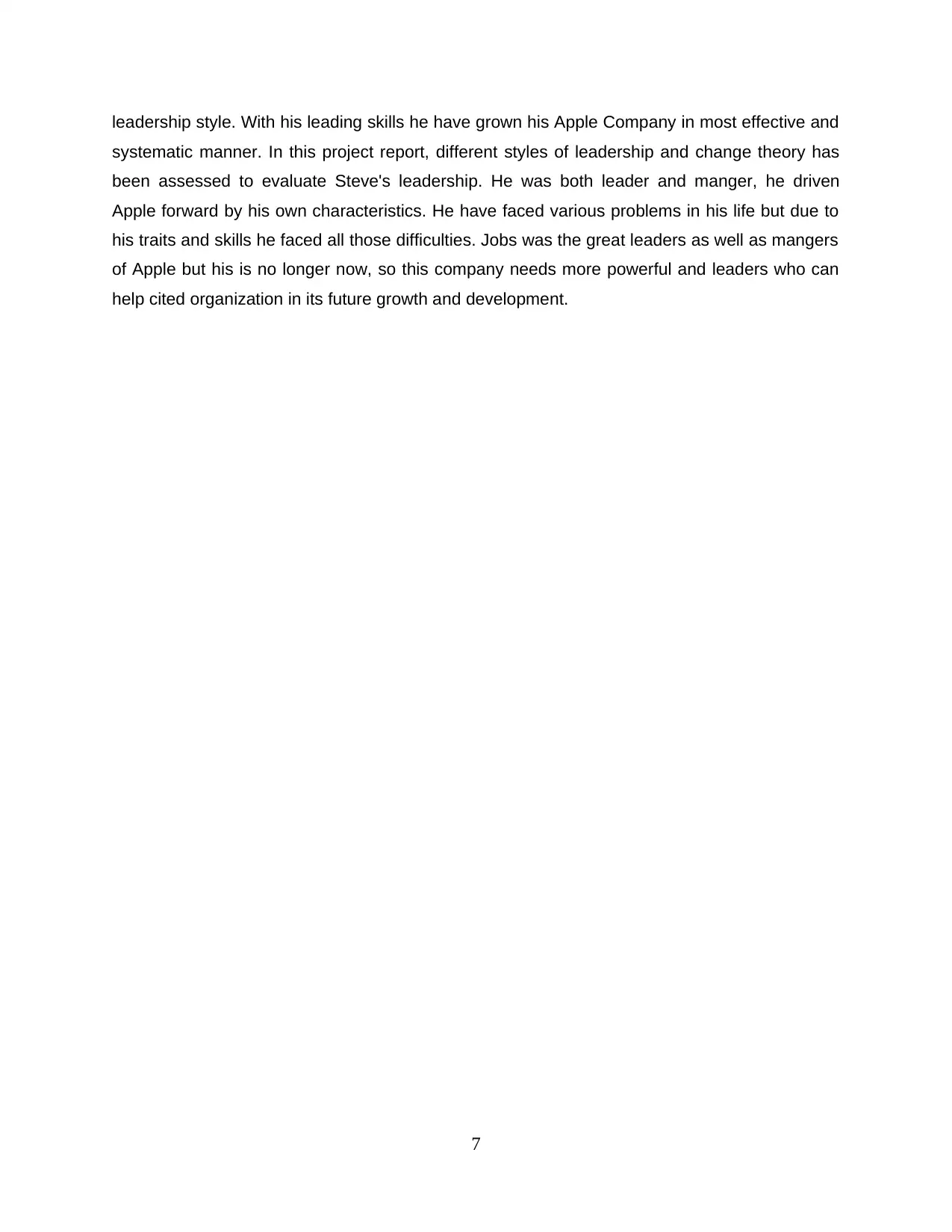
leadership style. With his leading skills he have grown his Apple Company in most effective and
systematic manner. In this project report, different styles of leadership and change theory has
been assessed to evaluate Steve's leadership. He was both leader and manger, he driven
Apple forward by his own characteristics. He have faced various problems in his life but due to
his traits and skills he faced all those difficulties. Jobs was the great leaders as well as mangers
of Apple but his is no longer now, so this company needs more powerful and leaders who can
help cited organization in its future growth and development.
7
systematic manner. In this project report, different styles of leadership and change theory has
been assessed to evaluate Steve's leadership. He was both leader and manger, he driven
Apple forward by his own characteristics. He have faced various problems in his life but due to
his traits and skills he faced all those difficulties. Jobs was the great leaders as well as mangers
of Apple but his is no longer now, so this company needs more powerful and leaders who can
help cited organization in its future growth and development.
7
Paraphrase This Document
Need a fresh take? Get an instant paraphrase of this document with our AI Paraphraser
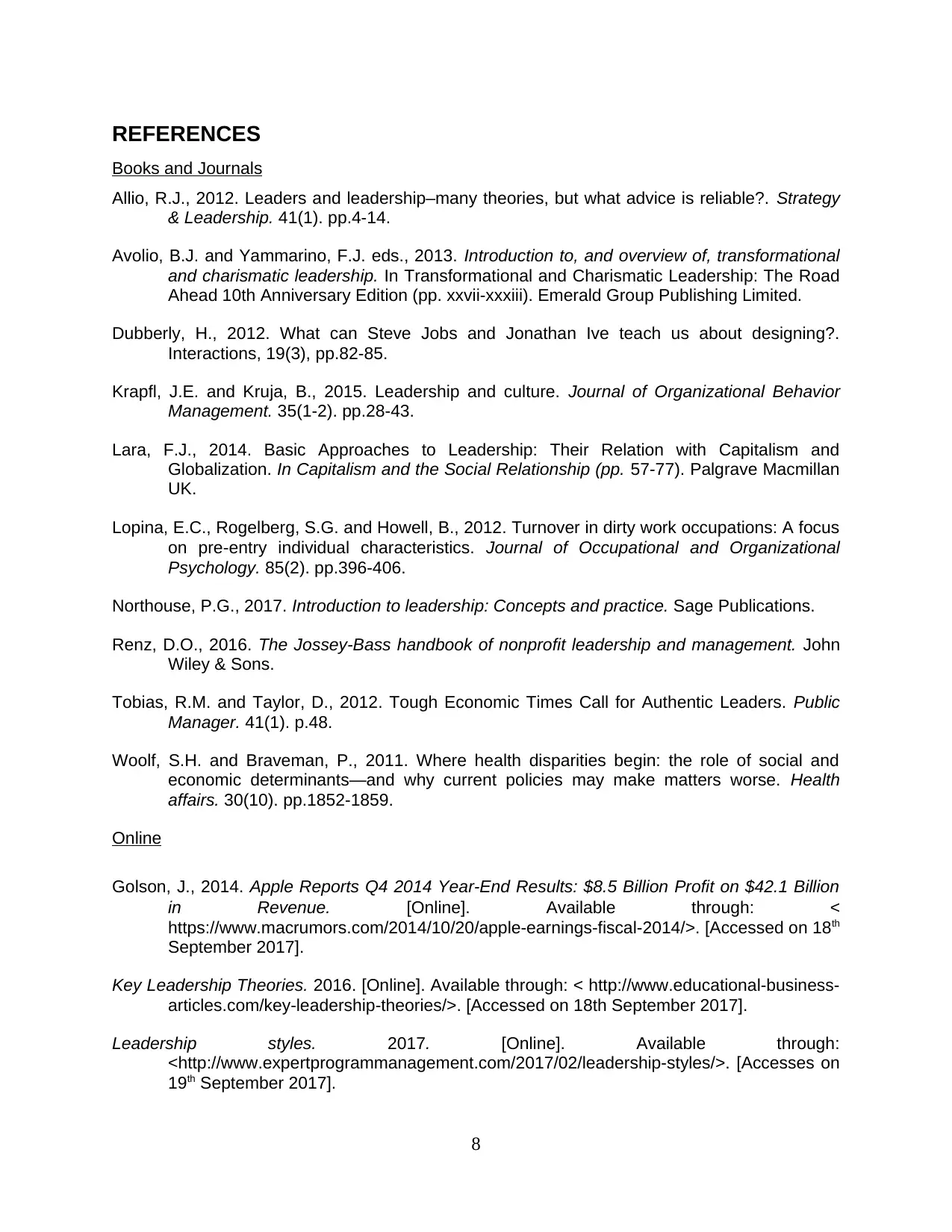
REFERENCES
Books and Journals
Allio, R.J., 2012. Leaders and leadership–many theories, but what advice is reliable?. Strategy
& Leadership. 41(1). pp.4-14.
Avolio, B.J. and Yammarino, F.J. eds., 2013. Introduction to, and overview of, transformational
and charismatic leadership. In Transformational and Charismatic Leadership: The Road
Ahead 10th Anniversary Edition (pp. xxvii-xxxiii). Emerald Group Publishing Limited.
Dubberly, H., 2012. What can Steve Jobs and Jonathan Ive teach us about designing?.
Interactions, 19(3), pp.82-85.
Krapfl, J.E. and Kruja, B., 2015. Leadership and culture. Journal of Organizational Behavior
Management. 35(1-2). pp.28-43.
Lara, F.J., 2014. Basic Approaches to Leadership: Their Relation with Capitalism and
Globalization. In Capitalism and the Social Relationship (pp. 57-77). Palgrave Macmillan
UK.
Lopina, E.C., Rogelberg, S.G. and Howell, B., 2012. Turnover in dirty work occupations: A focus
on pre‐entry individual characteristics. Journal of Occupational and Organizational
Psychology. 85(2). pp.396-406.
Northouse, P.G., 2017. Introduction to leadership: Concepts and practice. Sage Publications.
Renz, D.O., 2016. The Jossey-Bass handbook of nonprofit leadership and management. John
Wiley & Sons.
Tobias, R.M. and Taylor, D., 2012. Tough Economic Times Call for Authentic Leaders. Public
Manager. 41(1). p.48.
Woolf, S.H. and Braveman, P., 2011. Where health disparities begin: the role of social and
economic determinants—and why current policies may make matters worse. Health
affairs. 30(10). pp.1852-1859.
Online
Golson, J., 2014. Apple Reports Q4 2014 Year-End Results: $8.5 Billion Profit on $42.1 Billion
in Revenue. [Online]. Available through: <
https://www.macrumors.com/2014/10/20/apple-earnings-fiscal-2014/>. [Accessed on 18th
September 2017].
Key Leadership Theories. 2016. [Online]. Available through: < http://www.educational-business-
articles.com/key-leadership-theories/>. [Accessed on 18th September 2017].
Leadership styles. 2017. [Online]. Available through:
<http://www.expertprogrammanagement.com/2017/02/leadership-styles/>. [Accesses on
19th September 2017].
8
Books and Journals
Allio, R.J., 2012. Leaders and leadership–many theories, but what advice is reliable?. Strategy
& Leadership. 41(1). pp.4-14.
Avolio, B.J. and Yammarino, F.J. eds., 2013. Introduction to, and overview of, transformational
and charismatic leadership. In Transformational and Charismatic Leadership: The Road
Ahead 10th Anniversary Edition (pp. xxvii-xxxiii). Emerald Group Publishing Limited.
Dubberly, H., 2012. What can Steve Jobs and Jonathan Ive teach us about designing?.
Interactions, 19(3), pp.82-85.
Krapfl, J.E. and Kruja, B., 2015. Leadership and culture. Journal of Organizational Behavior
Management. 35(1-2). pp.28-43.
Lara, F.J., 2014. Basic Approaches to Leadership: Their Relation with Capitalism and
Globalization. In Capitalism and the Social Relationship (pp. 57-77). Palgrave Macmillan
UK.
Lopina, E.C., Rogelberg, S.G. and Howell, B., 2012. Turnover in dirty work occupations: A focus
on pre‐entry individual characteristics. Journal of Occupational and Organizational
Psychology. 85(2). pp.396-406.
Northouse, P.G., 2017. Introduction to leadership: Concepts and practice. Sage Publications.
Renz, D.O., 2016. The Jossey-Bass handbook of nonprofit leadership and management. John
Wiley & Sons.
Tobias, R.M. and Taylor, D., 2012. Tough Economic Times Call for Authentic Leaders. Public
Manager. 41(1). p.48.
Woolf, S.H. and Braveman, P., 2011. Where health disparities begin: the role of social and
economic determinants—and why current policies may make matters worse. Health
affairs. 30(10). pp.1852-1859.
Online
Golson, J., 2014. Apple Reports Q4 2014 Year-End Results: $8.5 Billion Profit on $42.1 Billion
in Revenue. [Online]. Available through: <
https://www.macrumors.com/2014/10/20/apple-earnings-fiscal-2014/>. [Accessed on 18th
September 2017].
Key Leadership Theories. 2016. [Online]. Available through: < http://www.educational-business-
articles.com/key-leadership-theories/>. [Accessed on 18th September 2017].
Leadership styles. 2017. [Online]. Available through:
<http://www.expertprogrammanagement.com/2017/02/leadership-styles/>. [Accesses on
19th September 2017].
8
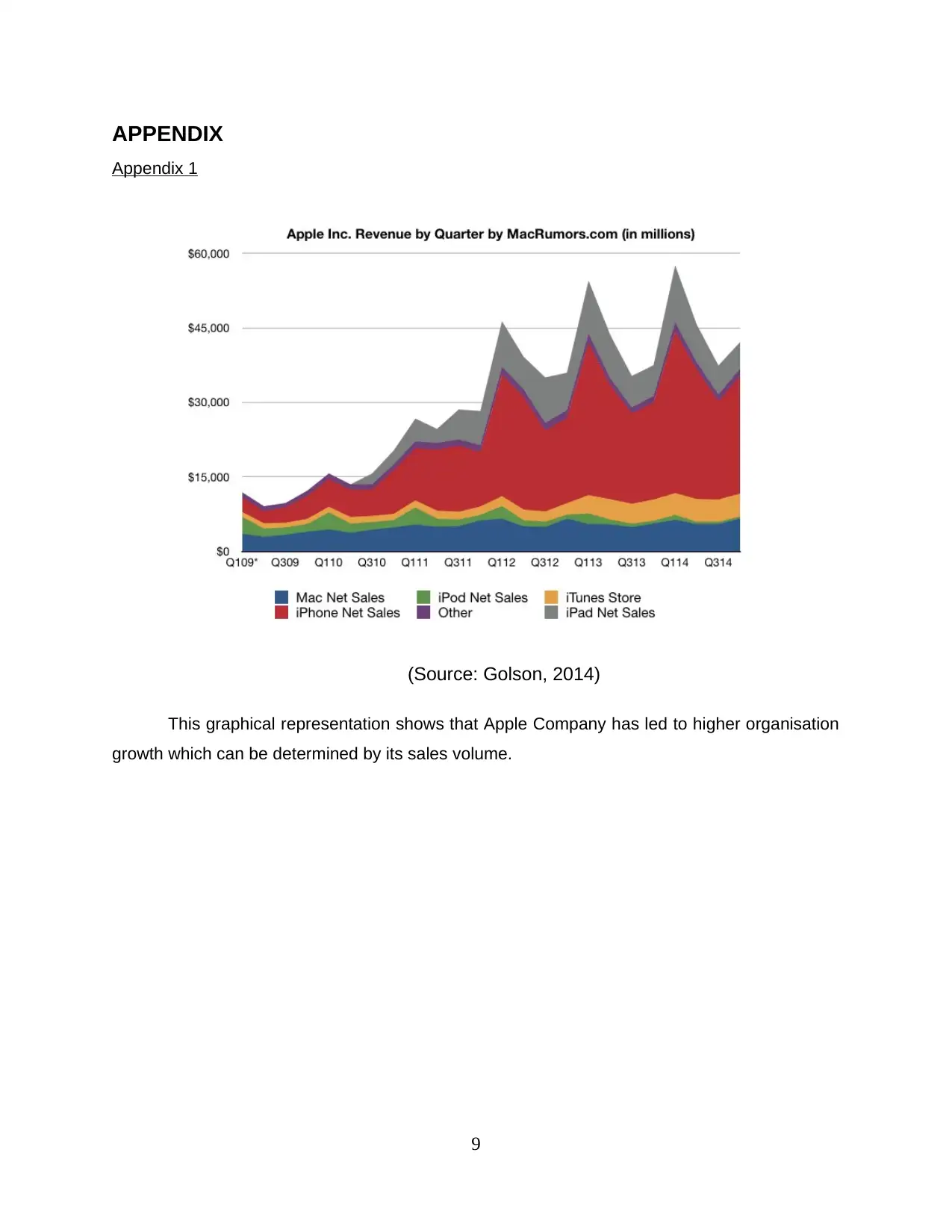
APPENDIX
Appendix 1
(Source: Golson, 2014)
This graphical representation shows that Apple Company has led to higher organisation
growth which can be determined by its sales volume.
9
Appendix 1
(Source: Golson, 2014)
This graphical representation shows that Apple Company has led to higher organisation
growth which can be determined by its sales volume.
9
⊘ This is a preview!⊘
Do you want full access?
Subscribe today to unlock all pages.

Trusted by 1+ million students worldwide
1 out of 13
Related Documents
Your All-in-One AI-Powered Toolkit for Academic Success.
+13062052269
info@desklib.com
Available 24*7 on WhatsApp / Email
![[object Object]](/_next/static/media/star-bottom.7253800d.svg)
Unlock your academic potential
Copyright © 2020–2025 A2Z Services. All Rights Reserved. Developed and managed by ZUCOL.




